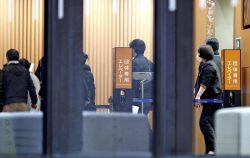New political framework in Syria: Break away from violence, work for national reconciliation
15:26 JST, January 14, 2025
Although Syria has been freed from a reign of terror that lasted half a century, it will not be easy to overcome the social divisions that have deepened due to its dictatorship and civil war.
First of all, the interim government must break away from violence and work for reconciliation among the people.
A month has passed since the government of President Bashar al-Assad collapsed in Syria. The armed forces that toppled the government have organized an interim government and begun a full-fledged process for building a new political framework, through such measures as appointing cabinet ministers.
The civil war has ended, but fighting continues in the northeast between Kurdish forces allied with the U.S. military and Turkish-backed forces. The cessation of violence and the integration of the country as a whole are still unpredictable.
Mutual distrust that remains among the people is one factor hampering national integration.
Most of the Syrian people are Muslim Arabs, but there are also Kurds and Christian Armenians. Prohibiting discrimination on the grounds of ethnicity, religion or other factors, as well as respect for women’s rights, should be the basis of Syria’s nation-building and the establishment of a new constitution.
Since the fall of the Assad government, the dark side of the dictatorship has come to light, including the discovery of mass graves in various locations where political prisoners were executed in the past. About 150,000 people are said to have gone missing in the civil war since 2011. The inhumanity of the Assad government is indeed horrifying.
In light of public demands to pursue those responsible for the repression, the interim government has decided to establish a special tribunal. The rule of law must be established by bringing to light the barbaric acts of the reign of terror and bringing about a fair judgment.
The support of the international community is essential for the reconstruction of the land devastated by the civil war. However, the main body of the interim government is Hayat Tahrir al-Sham (HTS), which originated from an extremist group that repeatedly carried out suicide bombings and kidnappings. The United States and others have designated HTS as a terrorist organization.
The United States, Europe and others have imposed economic sanctions on the Assad government for its support of terrorism. The international community should consider lifting sanctions and the designation of HTS as a terrorist organization, while carefully assessing whether the interim government led by HTS can continue to govern the country peacefully.
The regime change in Syria has drastically transformed the dynamics in the Middle East. The influence of Russia and Iran, which supported the Assad government, has weakened, and the supply of grain and energy from both countries has also reportedly been halted. As a result, there are concerns about the impoverishment of the people.
The foreign minister of the interim government has visited Arab countries such as Saudi Arabia to seek assistance. The nations concerned should start providing emergency assistance separately from the full-fledged lifting of sanctions so that Syria, which is regaining peace, will not slip back into chaos as a result of people’s worries over their livelihoods and other concerns.
(From The Yomiuri Shimbun, Jan. 14, 2025)
Top Articles in Editorial & Columns
-

Riku-Ryu Pair Wins Gold Medal: Their Strong Bond Leads to Major Comeback Victory
-

China Provoked Takaichi into Risky Move of Dissolving House of Representatives, But It’s a Gamble She Just Might Win
-

University of Tokyo Professor Arrested: Serious Lack of Ethical Sense, Failure of Institutional Governance
-

Japan’s Plan for Investment in U.S.: Aim for Mutual Development by Ensuring Profitability
-

Policy Measures on Foreign Nationals: How Should Stricter Regulations and Coexistence Be Balanced?
JN ACCESS RANKING
-

Japan PM Takaichi’s Cabinet Resigns en Masse
-

Japan Institute to Use Domestic Commercial Optical Lattice Clock to Set Japan Standard Time
-

Israeli Ambassador to Japan Speaks about Japan’s Role in the Reconstruction of Gaza
-

Man Infected with Measles Reportedly Dined at Restaurant in Tokyo Station
-

Videos Plagiarized, Reposted with False Subtitles Claiming ‘Ryukyu Belongs to China’; Anti-China False Information Also Posted in Japan




















